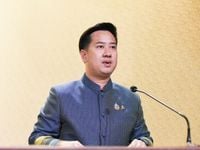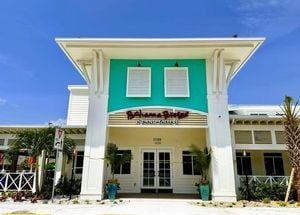On June 24, 2025, the Cabinet of Thailand approved an important extension and refinement of the "Financial Assistance Project for Entrepreneurs in the 3 Southern Border Provinces," a vital economic lifeline for businesses affected by ongoing unrest in the region. The project, aimed at supporting entrepreneurs in Yala, Pattani, Narathiwat, and four districts in Songkhla province, will now continue until December 30, 2027, providing much-needed financial relief and fostering confidence in local business operations.
The decision, announced by Mr. Paopoom Rojanasakul, Assistant Minister of Finance, and Mr. Anucha Burapachaisri, Deputy Secretary-General to the Prime Minister, reflects the government's commitment to sustaining economic momentum despite persistent instability. The Ministry of Finance proposed the extension to ensure continuity of support, recognizing the challenges entrepreneurs face in maintaining and expanding their businesses amid security concerns.
Since its inception on January 1, 2023, the project has already made a significant impact. As of May 16, 2025, a total of 2,980 loans amounting to 17,017 million baht had been approved under the program’s initial 25,000 million baht budget. These loans were distributed among 2,772 existing borrowers and 208 new entrepreneurs, with outstanding loans totaling 10,261 million baht. Remarkably, the program has maintained a clean record with no reported Non-Performing Loans (NPLs), underscoring its effectiveness and the borrowers’ commitment.
The original program was slated to conclude on June 30, 2025. Without the extension, participating entrepreneurs would have been required to repay their loans by this deadline, potentially destabilizing their financial footing and the regional economy. The Cabinet’s decision to extend the project from July 1, 2025, to December 30, 2027, ensures that businesses will have continued access to affordable financing, crucial for both recovery and growth.
Under the revised criteria, eligible applicants include Thai individuals and legal entities with over 50% Thai shareholding engaged in manufacturing, services, wholesale, or retail sectors. Importantly, these businesses must operate within the 3 Southern Border Provinces or the four districts of Songkhla: Thepha, Chana, Na Thawi, and Saba Yoi. The program also welcomes both existing borrowers and new entrepreneurs, including those acquiring or transferring businesses in the area.
The project’s primary objectives are to alleviate the interest burden on existing loans and provide working capital to support business recovery. It offers revolving credit with defined terms and long-term loans for capital investments such as factory expansion and machinery purchases. This dual approach addresses immediate liquidity needs while encouraging longer-term development.
The total loan facility under the extension is 15,000 million baht, divided into 12,000 million baht for existing borrowers and 3,000 million baht for new applicants. Priority is given to new borrowers to widen the program’s reach. Each borrower can access loans up to 20 million baht across all participating financial institutions, with existing borrowers capped at their previous loan amounts.
Repayment terms have been carefully structured to ease financial pressure. Borrowers must reduce outstanding loans to no more than 10 million baht by June 30, 2027, and fully repay remaining balances by December 30, 2027. Participating financial institutions are tasked with jointly developing repayment plans with borrowers to ensure feasibility and compliance with these timelines.
The Government Savings Bank (GSB) plays a central role in this initiative, providing low-interest loans (soft loans) totaling 15,000 million baht to both commercial banks and specialized financial institutions involved in the project. GSB charges a nominal interest rate of 0.01% per year to these institutions, which in turn lend to entrepreneurs at a special rate of 1.99% per year. This rate is significantly lower than typical commercial lending rates, offering a substantial financial advantage to borrowers.
Loan tenors vary by loan type: revolving credit for manufacturing businesses is capped at 360 days, while other businesses have a maximum term of 180 days. Long-term loans have a maximum duration of two years and six months from the issuance date of the promissory note. These terms provide flexibility tailored to the nature of the business and the purpose of the loan.
To ensure transparency and accountability, GSB will maintain a separate Public Service Account (PSA) for the project and incorporate its performance into broader assessments of lending efficacy and social impact. Participating financial institutions are required to conduct regular audits of loan approval processes and borrower compliance, submitting quarterly reports to GSB. This rigorous oversight framework aims to uphold the program’s integrity and effectiveness.
Financially, the government will compensate GSB for the cost of funds at a rate of 2% per year over the project’s 2.5-year duration, amounting to no more than 750 million baht. These payments will be disbursed as expenses occur and coordinated with the Budget Bureau for annual appropriations.
The extension and adjustment of this program come against the backdrop of ongoing unrest in Thailand’s southern provinces, which has dampened business confidence and investment. By providing affordable financing and structured support, the government hopes to mitigate these challenges, enabling entrepreneurs to sustain operations, invest in growth, and contribute to regional economic stability.
Mr. Paopoom Rojanasakul emphasized, "The government sees the necessity of continuous assistance to ensure entrepreneurs in these provinces can keep their businesses running and drive economic progress in the region." Likewise, Mr. Anucha Burapachaisri highlighted the importance of the program’s smooth continuation, noting, "Without this extension, entrepreneurs would face the burden of immediate loan repayments, risking financial disruption." Their statements underscore the program’s role as a crucial economic stabilizer.
Overall, this renewed commitment reflects a broader strategy to balance security concerns with economic development in Thailand’s southern border provinces. By combining low-interest loans, rigorous oversight, and clear repayment frameworks, the government aims to foster a resilient business environment that can withstand and eventually overcome the challenges posed by instability.
For entrepreneurs in Yala, Pattani, Narathiwat, and the specified districts of Songkhla, this program offers a lifeline—one that could mean the difference between shuttered businesses and sustainable growth. As the region navigates its complex socio-political landscape, such financial support is not just welcome but essential.




